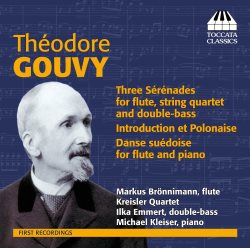|

Support us financially by purchasing
this through MusicWeb
for £10.50 postage paid world-wide.

|
Théodore GOUVY (1819-1898)
Sérénade in D minor, Op. posth. (1891, ed. Olivier Schmitt) [11:06]*
Sérénade No. 2 in F, Op. 84 (1889) [18:55]*
Sérénade No. 1 in G, Op. 82 (1888) [22:24]^
Introduction et Polonaise for flute and piano (1890) [5:15]^
Danse suédoise for flute and piano (arr. from Wind Octet, 1879) [3:56]^
Markus Brönnimann (flute)
Kreisler Quartet (serenades)
Ilka Emmert (double bass: serenades)
Michael Kleiser (piano: Introduction, Danse)
rec. Grosser Sendesaal, Saarländisch Rundfunk, Saarbrücken, * October 2012, ^January 2013
TOCCATA CLASSICS TOCC 0185 [61:42]
Théodore Gouvy was born to a Walloon family who resettled in Prussia in his youth. Perhaps because of this mixed national background, his scores found favour with neither French nor German tastemakers during his lifetime. Today, at a temporal distance from that particular brand of pettiness, we can instead appreciate his music as drawing from the best of both the French and German styles.
I'd previously heard the composer's oratorio Oedipe à Colone, but this was my first encounter with his chamber music. These Sérénades for flute and strings have an immediate melodic appeal and textural clarity that are very "French". However, the firmly grounded sonorities and strongly directional harmonies, reflecting German influence, lend the music a sense of substance and weight.
The producers have programmed the Sérénades in reverse chronological sequence, presumably to build up to the G major, the longest and most intricately woven of the three. In its opening Pastorale, both strings and flute wind through the first subject in a leisurely manner, before the music ducks into a nervous E minor. The deceptively simple Intermezzo movement is lyrical and graceful, the Larghetto pensive and spacious. The theme of the Rondo has a hearty, folklike rhythmic swing, contrasted with more energetic passages to follow.
Where the F major Sérénade prominently highlights the flute against the strings, elsewhere Gouvy opts for a chamber-music parity among the instruments. The flute occasionally doubles the first violin, or partners it at the third. Several times, I forgot that I was hearing a mixed ensemble.
Three of the four movements of the F major Sérénade are quite fetching. It's risky to launch a multi-movement piece with a theme and variations - you feel as if you've been thrown into the middle of something - but the marked contrasts of style and mood draw you in. The Scherzo is lively, its duple meter lending it an air of seriousness and weight. And the closing Rondo giocoso is bright and cheerful, with a clean, Classical rhythmic profile.
Only the Lamento doesn't work. Gouvy's clear intention was to fashion a broad, elegiac singing line over a treading bass. But the bass figure is so busy that it sounds almost chipper; and it begins after the beat, rendering the scansion unclear. Besides, the movement, at just 2:44, ends before it's had time to get going.
The single-movement, unpublished Third Sérénade, realized by musicologist Olivier Schmitt from a variety of manuscripts, here functions as a sort of overture to the program. It's a sonata-form movement, attractive but pretty standard until accelerating string tremolos usher in a fiery coda.
The two flute-and-piano pieces are tuneful and lilting - the Polonaise section of the Introduction et Polonaise is particularly infectious. The origins of the Danse suédoise are rather complicated. It was originally part of Gouvy's Octet, Op. 71. The Leipzig arranger August Horn transcribed it for violin and piano; soloist Markus Brönnimann himself has, in turn, reworked Horn's transcription to suit the flute.
Brönnimann's playing, beautiful throughout the program, can most readily be enjoyed in the F major Sérénade. His first, low-range entry is firm in a register that's customarily weak, and his timbre is round, almost velvety. As the line ascends, the tone gains in clarity without turning aggressive. He's not a flashy player, though he certainly has dexterity to spare where the music wants it; rather, it's the poise and patience with which he spins out the passagework that lingers in the mind.
The Kreisler Quartet members, joined by bassist Ilka Emmert, play sensitively and with alert rhythmic address. Michael Kleiser's pianism is solid, with layered textures. The sound is fine, but be judicious with the volume: at a setting that produces a vivid string presence, the flute's high notes hit the mikes hard. The program notes, including copious musical examples, are helpful and informative.
Stephen Francis Vasta
Stephen Francis Vasta is a New York-based conductor, coach, and journalist.
|



 All Nimbus reviews
All Nimbus reviews








